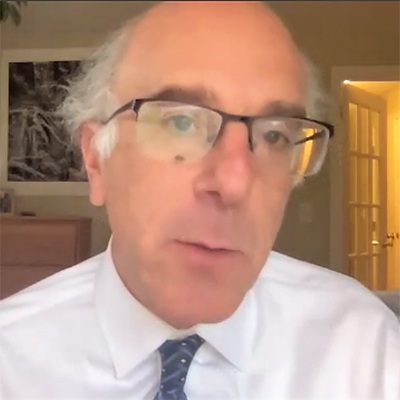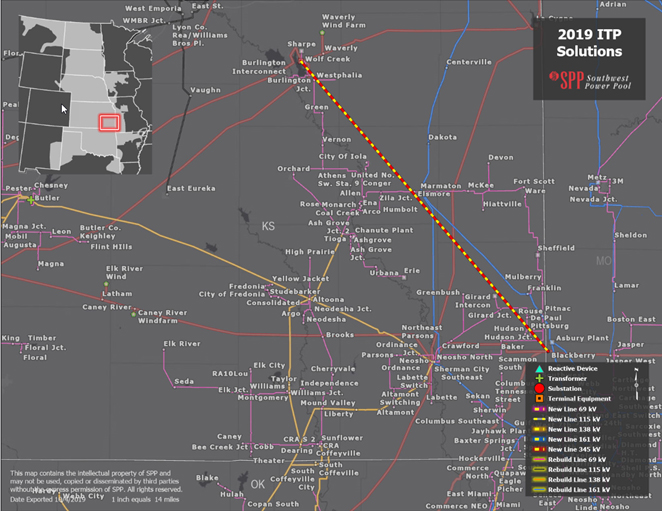[EDITOR’S NOTE: A previous version of this article incorrectly stated that Southwest Transmission, the designated alternate transmission owner for SPP’s Wolf Creek-Blackberry competitive project, is an affiliate of Xcel Energy. It is affiliated with LS Power.]
SPP’s Board of Directors last week approved the RTO’s third competitive transmission project under FERC Order 1000, awarding construction of a 94-mile, 345-kV line to NextEra Energy Transmission Southwest.
An industry expert panel (IEP) recommended the competitive transmission company be designated the Wolf Creek-Blackberry project’s transmission owner. The line, from southeast Kansas to the Blackberry substation in Missouri, has an estimated $85 million cost and a 2025 completion date.
Michael Jacobs, a senior energy analyst for the Union of Concerned Scientists, who chaired the IEP, said NextEra’s proposal was “clearly competitive” and “tens of millions of dollars” lower than other bids.
NextEra’s estimated cost was $31 million lower than the next closest proposal of $116 million. SPP received six other proposals from four different entities, with the highest being $151 million.
 Michael Jacobs, UCS | SPP
Michael Jacobs, UCS | SPPJacobs said the bid’s designs and materials were not offered in other proposals and its conductors had the highest thermal ratings. NextEra also offered an earlier service date by a year and a guaranteed schedule, he said.
“We looked at how [NextEra’s financial strategies] might be reasonable as opposed to a cost-cutting measure,” Jacobs said. “They took care where they could to both limit the cost to themselves, but also to the consumer.”
The IEP panel gave NextEra’s bid a 1,034.38 score on an 1,100-point scale after analyzing the seven proposals in engineering design, project management and construction, operations, rate analysis, and finance categories.
LS Power’s Southwest Transmission affiliate was approved as the alternate builder. It scored 1,013.92 points with its $121 million proposal, edging out the third-place bid, which scored 1,013.50.
Evergy, Nebraska Public Power District, Oklahoma Gas & Electric and Public Service Co. of Oklahoma abstained from the Members Committee’s votes on the lead and alternate proposals. Evergy said the final report was heavily redacted, making it difficult to support or oppose the IEP’s decision.
SPP issued a request for proposals in September 2020 and the five-person IEP panel was seated shortly thereafter.
The grid operator previously has approved two competitive projects, the first of which was subsequently withdrawn over changing load projections. (See SPP Cancels First Competitive Tx Project, Citing Falling Demand Projections.)
A third potential project was withdrawn shortly after it went out for bids earlier this year. (See SPP Board/Members Committee Briefs: April 28, 2021.)
Board Approves SCRIPT Recommendations
The board approved the final report from the Strategic and Creative Reengineering of Integrated Planning Team (SCRIPT) and creation of a task force to coordinate implementation of the report’s recommendations.
The endorsement caps a year-long effort to develop recommendations that improve SPP’s transmission planning and applicable cost-allocation processes, including the RTO’s delayed generator interconnection study process.
 The Wolf Creek-Blackberry 345-kV project. | SPP
The Wolf Creek-Blackberry 345-kV project. | SPPThe SCRIPT report included 35 recommendations and 11 sub-recommendations. Staff has said the consolidated planning process will save $3 million to $4 million annually in administrative costs once it is in place. SPP currently incurs about $28.5 million in annual costs for its planning processes. (See SPP: Consolidating Tx Planning Could Yield Big Savings.)
SPP expects the policies, to be developed and implemented by 2024, to reduce administrative costs, create more equitable cost sharing, increase transmission investment value, facilitate access to new energy markets, create more timely processes, and strengthen reliability and grid resiliency.
The Markets and Operations Policy Committee approved the report but not the recommendations during its meeting earlier in October, citing concerns over project oversight and demands on staff. (See “MOPC Approves SCRIPT Report,” SPP Markets and Operations Policy Committee: Oct. 11-12, 2021.)
SCRIPT’s leadership recommended a Consolidated Planning Process Task Force comprised of members from the stakeholder groups most affected by the consolidated planning process, primarily the Transmission and Economic Studies working groups. The team will include a regulatory liaison from the Regional State Committee to help manage the engineering and cost-allocation work.
The task force will report up to the board and receive guidance from MOPC, the RSC and the Strategic Planning Committee (SPC).
Slight Delay in RTO West Commitment Date
The Western Area Power Administration’s Colorado River Storage Project (CRSP) region has told parties interested in SPP’s RTO West that it needs additional time to update its analysis, Bruce Rew, senior vice president of operations, told directors and stakeholders.
With Colorado Springs Utilities’ late addition to the parties interested in joining SPP West, the CRSP region said it needed more time to complete its Federal Register notice and associated public process. That pushes the initial financial commitment target date of April 15, 2022, back two weeks to April 30, Rew said.
SPP plans to file tariff modifications with FERC in October 2022. It expects approval in early 2023, allowing it to extend its RTO into the West on March 1, 2024.
The board also approved the DC Ties Task Force’s recommended framework to manage DC tie revenue-requirement recovery as part of RTO West. The market efficiency use (MEU) mechanism will compensate DC ties for their market use and be applied to DC-tie market dispatch beyond network and point-to-point use. The group said that would ensure their market use is properly compensated for and does not adversely affect the DC tie’s host zone. (See SPP Strategic Planning Committee Briefs: Oct. 13, 2021.)
Basin Electric Power Cooperative’s Tom Christensen opposed the Members Committee vote, as he did during the SPC meeting, over concerns that the framework doesn’t resolve congestion issues and may hamper full recovery of the annual transmission revenue requirement. OG&E, Oklahoma Municipal Power Authority and Southwestern Public Service Co. abstained from the vote.
“If we go down [MEU’s] path and find it’s not workable, we’ll look for other alternatives,” Rew said, addressing the concerns. “We’ve got to have a product that’s workable. We’ll make adjustments if we run into issues.”
The task force will continue its engagement with RTO West’s interested parties to fully develop the MEU rate. A stakeholder group comprised of market interests and DC tie owners will also be formed to take up the congestion-hedging effort.
Budget Increase Passes
The members (unanimously) and directors approved SPP’s 2022 operating budget of $231.2 million, a 17.7% increase over this year’s budget, driven by an increase in outside services that raised the net revenue requirement from $149.9 million to $176.3 million.
The outside services are primarily related to engineering study costs and for anticipated ongoing litigation associated with the zonal placement process, Attachment Z2 credits, and February’s winter weather event. One winter-related complaint has been filed at FERC with claims totaling $79 million, SPP said.
Travel expenses are also expected to rise with a return to normal operations following the COVID-19 pandemic.
Responding to a question as to whether SPP has enough staff resources at its disposal to process the generator interconnection backlog and handle transmission-planning pieces, CEO Barbara Sugg said the budget is “very well-thought-out, but the landscape changes.”
“We’re moving people around; we’re looking at consultants. We do what we can with what we’ve got,” she said. “If we have to make another ask, we’ll follow the process to do that.”
The board also approved the Diversity, Equity and Inclusion (DEI) Task Force’s 10 recommendations, which included reinforcing talent pipelines through historically Black colleges and universities; community programs and business resource groups; evaluating community giving and volunteer efforts; and designating oversight of a formal DEI program. The RTO was recently named by Arkansas Business magazine as one of the Best Places to Work in Arkansas because of its strong corporate culture and benefits.
3 Directors Ending their Terms
Members re-elected Susan Certoma to the board during their annual meeting but said good-bye to three other directors leaving at the end of the year.
Julian Brix, Graham Edwards and Darcy Ortiz will take with them a combined 21 years of experience on the board, 13 by Brix. His departure leaves Josh Martin (elected in 2003) and Chairman Larry Altenbaumer (2005) as the longest-serving directors.
 Director Julian Brix reflects on his 15 years with SPP. | SPP
Director Julian Brix reflects on his 15 years with SPP. | SPP“This may well be the most important job I’ve done, since I started in the industry 40-plus years ago,” said Brix, who has led a transmission company and two cooperatives. “At some point in time, God comes along and says, ‘Stop,’ and he did this past year. It’s time for me to step down and let others do the work.”
Board vice-chair Edwards, who pre-dated John Bear as MISO’s CEO, had originally intended to seek re-election, but withdrew his nomination after the meeting materials went out. The Advanced Power Alliance’s Steve Gaw credited Edwards with thawing the MISO-SPP relationships and turning it “completely on its head.”
Ortiz is leaving the board after one term of three years, two of which were conducted virtually. As Intel’s vice president of corporate services, she was recently assigned global responsibilities, making it difficult to “do justice to her [dual] responsibilities,” Sugg said.
“They’ve definitely made an imprint on us and made SPP a better place,” Sugg said. A search for new directors is ongoing and will be brought forward as soon as possible, she said.
Members also elected Evergy’s Denise Buffington to the Members Committee, where she will replace former co-worker Kevin Noblet in representing the investor-owned utilities (IOUs). Re-elected to the committee are:
- Usha-Maria Turner (Oklahoma Gas & Electric) and Tim Wilson (Liberty Utilities), representing IOUs.
- Zac Perkins (Tri-County Electric) and Mike Wise (Golden Spread) for the cooperative segment;
- Kevin Smith (Tenaska Power Services) for independent power producers and markets; and
- Tom Kent (Nebraska Public Power District) in the state agency segment.
Standalone ESR Accreditation
Renewable energy representatives withdrew from the consent agenda a revision request that would place the first SPP accreditation policy on standalone energy storage resources (ESRs) to ensure further discussion. Recommended by the Supply Adequacy Working Group, RR462 implements a process that includes a methodology for prioritizing and allocating available effective load carrying capability (ELCC) for standalone ESRs that qualify as capacity in SPP’s balancing authority.
Gaw said the changes to the current methodology affect rates, terms and conditions, necessitating their inclusion in SPP’s tariff rather than its business practices or criteria. His written comments also expressed concern about the calculation methodology and how conventional resources are accredited.
“We have continued concern that there is a diminution of the value on renewable resources, storage and hybrid resources, but we’re still not acknowledging traditional resources’ forced outages,” he said. “We’re giving them 100% accreditation while evaluating and scrutinizing other resources. That starts to grant a preference to certain resources inappropriately.”
Enel Green Power’s Betsy Beck said that while she supports the ELCC approach, she wanted the board to recognize there wasn’t full consensus on the measure.
“Some of the underlying assumptions … led to some results that, at best, didn’t make sense and, at worse, weren’t well supported. The results don’t support what we’re seeing in the market for the value of standalone storage,” she said.
Dogwood Energy’s Rob Janssen advocated for moving forward with the measure, given that load-serving entities and the storage developer community have been “pleading with SPP for several years for a clear method” in accrediting capacity. However, he agreed the accreditation methodology will likely need refinement because it deviates from SPP’s ELCC study results for shorter-duration storage facilities and will not adequately compensate developers and LSEs for the resource adequacy value they should provide to the system.
The Members Committee approved the measure as part of the consent agenda. It was opposed by Beck and Gaw, with Janssen and ITC Great Plains’ Brett Leopold abstaining.
The consent agenda listed one other revision request in RR467, a Holistic Integrated Tariff Team recommendation that revises the tariff’s Attachment AQ by reducing the waiting period for preliminary study results of new load additions. The measure adds a rolling submission and response window and directs delivery point network studies be posted once the new or modified load is confirmed.
The consent agenda also included Corporate Governance Committee nominations to the Finance (OG&E’s Brad Cochran) and Human Resource committees (Sunflower Electric’s Stuart Lowry); the Finance Committee’s approval of a change to the virtual reference price’s calculation and extending to 2027 the maturity date of an $80 million credit facility; SPP’s 2020-2021 annual violation relaxation limits (VRLs) analysis and the Western Energy Imbalance Service market’s 2021 VRL analysis; and withdrawals of three construction notifications for 161-kV breakers.




